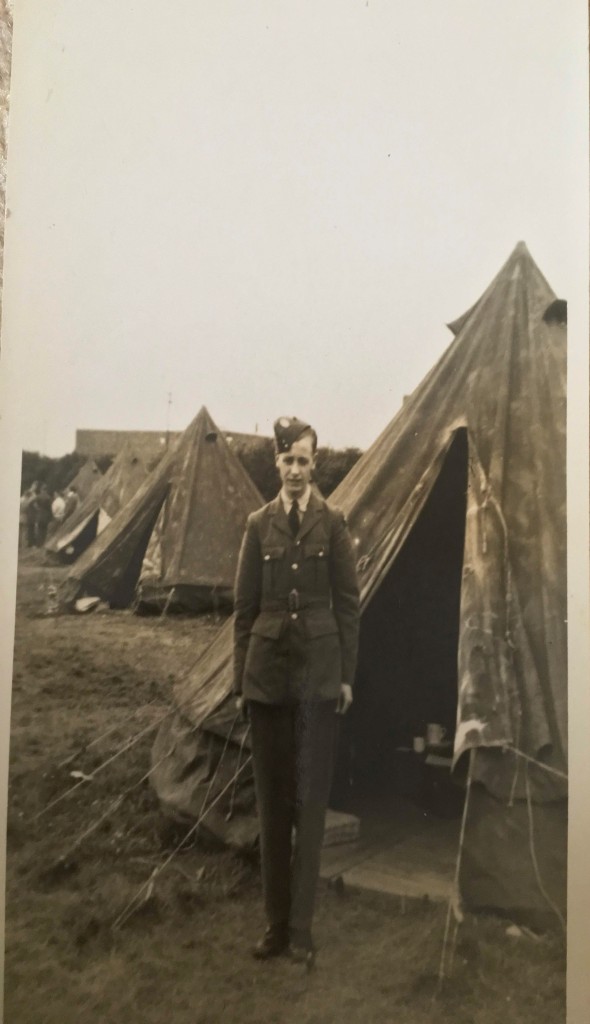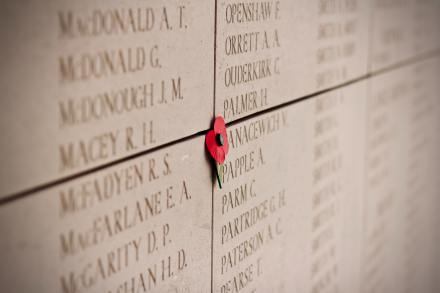My sermon/reflection for Remembrance Sunday at the weekend; you can watch the whole service here: https://youtu.be/0qHwW4Vj0B4
Is there someone in particular you remember on Remembrance Day?
For me, it’s my granddad. Harry Smith, or Sergeant Henry Smith, to give him his full title.
What’s perhaps a little unusual is that Granddad didn’t die in world war 2. But I’ve got to know a bit more about his story, and it’s quite remarkable: he was in the RAF, based down in Kent. In July 1940, on a routine patrol mission, his plane was shot down over the Hook of Holland. The other three members of his crew were killed; Granddad was taken POW and was in camps in Poland for the rest of the war, during which time both his parents died.
But my brother and sister and I didn’t know him as Sgt Henry Smith, rear gunner and former POW. He was Granddad, who lived with Grandma in Willerby, just outside Hull. After the war, he’d returned to England, married Edna, our Grandma, raised a family and worked as a civil servant and then as a minister in the United Reformed Church. If you didn’t know his story – and he only once talked about it – you wouldn’t have guessed how eventful those 6 years had been.

Ordinary people, extraordinary events
Forgive for talking so much about my Granddad.
But this is one of the things that I find most remarkable, at Remembrance and whenever I think of the wars this country has been involved in.
These were – and are – huge, world-changing events with consequences that reverberate down the decades.
Yet those involved in them, those at the centre of them, were mostly ordinary people. They weren’t brought up to be heroes or do extraordinary and brave things. Afterwards, those who survived mostly went on to live what we would call ordinary lives.
Yet for those few years, they were at the epicentre of these earth-shaking happenings, ordinary people suddenly finding themselves at the centre of these extraordinary events.
A bit like the disciples.
Jesus has just told them that the Temple – the beautiful, imposing building, the sign of God’s presence with His people – will be razed to the ground. No stone will be left on top of another.
If we’re talking about extraordinary events, then for the people of Israel, this was as extraordinary, and devastating, as any war.
He tells them that they’ll hear about wars from all over, that false prophets will claim this is the end of the world, and that there’ll be earthquakes and famines and comets and all sorts that some will see as signs of the end.
So He’s talking big stuff here: huge events that will reshape the world as they knew it, things they couldn’t possibly hope to be able to control.
At the centre of it all
But then, He suddenly focuses in on the disciples themselves.
“They will seize you and persecute you,” he says. “You will brought before kings and governors,” He tells them.
Suddenly, as these extraordinary events begin, the disciples are at the very centre of things. They’re not just spectators of the show: they’re central to all that’s about to happen.
Now, we can over-exaggerate how simple and uneducated the disciples were; they must have had a bit of gumption about them.
But they were not brought up to be the main players in a cosmic, heavenly drama like this. Yet Jesus is telling them that, just like those ordinary people thrust into the centre of world-changing wars, they will find themselves playing a key part in all that’s He’s saying will unfold.
What is that part? What will they be doing?
Opportunities
Jesus tells them that the arrests and persecution and imprisonment they face will be their “opportunity”.
I don’t know if Granddad or any other POW saw their captivity as opportunity. But Jesus says that as they face priests, governors and even kings, they will have the chance to speak, to testify.
To what?
To Jesus.
These ordinary people will get the chance to proclaim to the great and good that Jesus, who died on the cross in seeming shame and defeat, has been raised by God from the dead and is now Lord over all the earth.
That no other power, whether people, laws, buildings, spiritual powers – nothing has greater power or authority than Him. The fall of the Temple will be a sign of this.
And that He calls all people, extraordinary and ordinary, to turn to Him, and find God’s forgiveness and new life in Jesus.
And if you read the book of Acts, kind of the sequel to Luke’s Gospel, you’ll find that’s exactly what they did.
Ordinary people will be called to do extraordinary things: those who seem nothing in the eyes of the world will be testifying to the powerful and mighty about the One they’ve come to see as greater than all.
Just as ordinary people – especially those whom we remember today – were suddenly called to play their part in events that reshaped our world.
Just as we – seemingly ordinary Christians – are sent to be part of God’s extraordinary, ongoing work in the world; the work that flows out from what the disciples first declared to the great and the good.
Declaring the Lord
It’s our job, our calling, to declare to the world that Jesus Christ is Lord of all, that no power – government, military, even religious – has power over Him, and that in Him is healing, forgiveness and new life for all who will turn to Him.
Why? Why do we need to declare this?
Because we think it’d be nice for people to know?
Because we want more people to come to church?
Because it’ll get us more brownie points in heaven?
No: because this is the message that the world needs to hear.
For the first time in many years, there is war being fought in Europe as we remember the fallen. A time we thought had passed has come back to haunt and threaten us, as Ukrainians fight to defeat an unprovoked and brutal invasion, a display of ugly, naked power.
All this as wars are fought in so many other countries, as we still deal with the threat of covid, as the great and the good meet in Egypt to debate how to tackle the crisis facing our environment.
Feeling ordinary, doing the extraordinary
Against all this, we might feel as if we have nothing. Only God can change these situations, right?
Well, yes. But He uses us to do this work.
To speak of and to show the way of peace, the way of self-sacrifice, the way of hope, the way of putting others first that Jesus lived out and calls us to live out.
To tell others that Jesus is Lord and that in Him, and in Him alone, is everything that the world fights over.
To go to the ordinary, ignored and forgotten and tell them how, in God’s Kingdom, they are lifted up and treated as extraordinary.
Maybe we won’t get to stand before kings and rulers to say this.
Maybe we won’t face persecution and death because of this – though let’s remember our brothers and sisters who face exactly that.
Maybe we won’t see the fruits of what we do, just as the fallen whom we remember today didn’t see the outcomes of their efforts.
But if we do this we’ll have been part of something extraordinary, something wonderful that God is doing in His world.
We’ll have been making real the hope that we express every Remembrance Sunday: that the deaths of those we remember today, soldiers and civilians, won’t be in vain.
That the peace we long for will one day take hold, and there will be no more names added to memorials and books of remembrance.
That hope is only truly possible through Jesus Christ. Our job, however ordinary we feel, is to show and share and speak this news, so that others might believe and the hope become a little more of a reality.
Cover photo by Jelleke Vanooteghem on Unsplash
